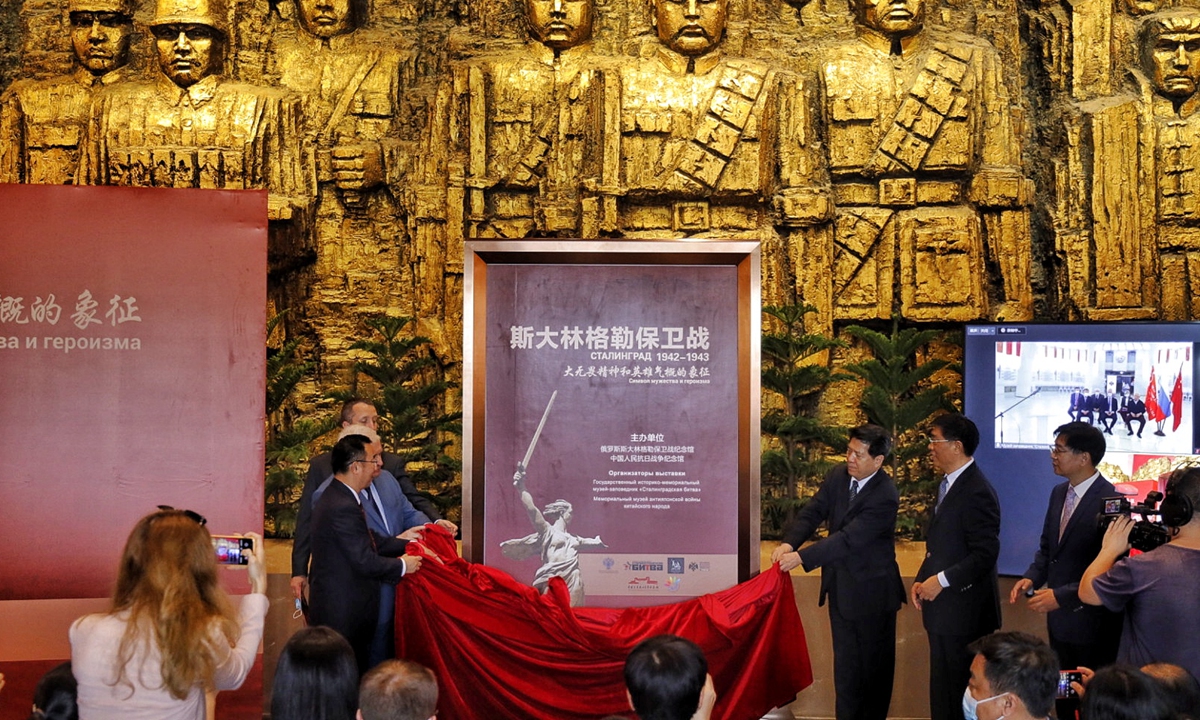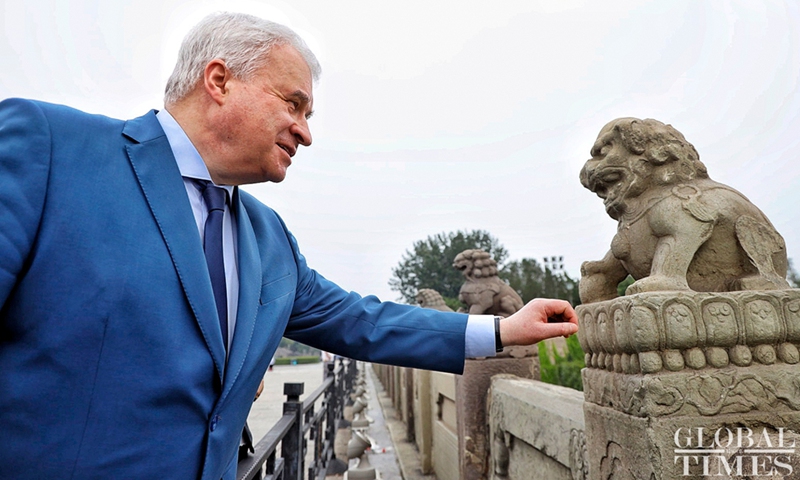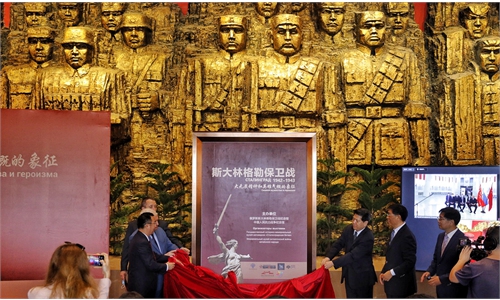
A special exhibition "The Battle of Stalingrad - symbol of intrepidity and heroism" opened at the Museum of the War of Chinese People's Resistance Against Japanese Aggression in Beijing.Photo:Li Hao/GT
To mark the 76th victory anniversary of the War of Resistance Against Japanese Aggression (1931-45), China and Russia - two major contributors to wining WWII - jointly held memorial activities, which analysts said intends to urge Japan to truly reflect on its military mistakes instead of binding itself increasingly tighter with the US and endangering regional peace and stability. This is the latest and vivid example of the highly accordant values and mutual trust shared by China and Russia.
At the opening ceremony of the Plenary Session of the Sixth Eastern Economic Forum on Friday, Chinese President Xi Jinping said that on August 25, he spoke with President Putin on the phone and they agreed that the international community must defend firmly the victorious outcomes of World War II, safeguard the truth of history, and stay committed to taking history as a mirror to open up a brighter future.
In facing the US and its Western allies' campaign to obliterate Russia's role in WWII and Japan's lack of reflection on historical issues, China and Russia share common ground in terms of their attitudes and evaluations of World War II, and have worked together to defend the truth of history. Moreover, the two countries are working closer to resist forces that may destabilize regional peace, analysts said.
On Friday, Chinese State Councilor and Foreign Minister Wang Yi and Russian Foreign Minister Sergey Lavrov also addressed a commemoration at the Dongning Fortress Museum in Mudanjiang, Heilongjiang Province.
The war in Dongning Fortress was the last war of the World Anti-Fascist War. Wang said that it witnessed the history of Chinese and Russian people standing together in the fight and the victory showed that peace and justice could smash all aggressions.
History cannot be denied and the outcome of WWII should be respected. However, until today, some people are trying to deny or even whitewash the invasion history, which severely challenges the conscience of humans and international justice, Wang said, noting that China would work with Russia and the international community to reject such wrong deeds.
On Friday, a special exhibit, "The Battle of Stalingrad - Symbol of Intrepidity and Heroism," opened at the Museum of the War of Chinese People's Resistance Against Japanese Aggression in Beijing. The exhibit is also co-hosted by Russia's Battle of Stalingrad State Historical and Memorial Museum-Reserve.
The exhibit representing China-Russia friendship displays about 200 precious historical pictures and 63 cultural relics, telling of the WWII turning point of Battle of Stalingrad, showing the history of resistance to fascism, and embodying the common value pursuit of mankind to safeguard peace and justice.
About 7,000 people visited the exhibit on the special day and some of them laid flowers in front of a monument of war heroes at the museum.

Russian Ambassador to China Andrey Denisov on Friday visits the Lugou Bridge. On July 7, 1937, Japanese soldiers attacked Chinese forces at Lugou Bridge, also known as the Marco Polo Bridge, marking the beginning of Japan's full-scale invasion of China. Photo:Li Hao/GT
Russia Ambassador to China Andrey Denisov attended the exhibit and told the Global Times that the exhibit is also a reminder to "our neighbors" on the result of aggressive plots.
The position of China and Russia is to resist hostile views and actions of some countries trying to impose their values on others, and to introduce a more balanced approach to relations among countries, especially neighboring countries, as "our safety and security is inseparable from that of our neighbors. It is not a zero-sum game; it's a win-win game, Denisov said.
Many places in China also held activities to commemorate the hard-won victory. The topic with the hashtag of "76thanniversary for the V-Day" on China's social media Sina Weibo has been viewed more than 1.37 billion times with more than 8.93 million discussions. Some netizens reposted video footage and photos of Japanese representatives signing the official Instrument of Surrender on September 2, 1945, the tragic scenes of Chinese civilians being slaughtered by Japanese troops, and the bravery of the Chinese people.
"From the September 18 incident in 1931, the beginning of Japan's invasion of China, to Japan's surrender in 1945, the Chinese people had experienced an extremely hard and bitter fight. We commemorate V-Day every year not only to mourn those who sacrificed but also to remember the history and to cherish the current peace," a netizen named "chuanggezi" wrote.
The Chinese people had fought hard to win the War of Resistance Against Japanese Aggression during the 14 years from 1931 to 1945 with more than 35 million Chinese soldiers and civilians dead, accounting for nearly 8 percent of China's population in 1928. It is the main battlefield against Japanese fascism before the Pacific War (1941-1943), Japan deployed about 80-94 percent of its troops in China during the period.
Standing with each other
The US and some forces in the EU are working to falsify or obliterate Russia's role to portray the US as a major force in victory, and international studies on the Anti-Fascist War seldom pay enough attention to China's contributions, partly due to the postwar ideological confrontation during the Cold War and Japan's denial of the invasion's truth. Against this backdrop, China and Russia have worked together to defend history.
Yuri Tavrovsky, head of the Expert Council of the Russian-Chinese Committee for Friendship, Peace and Development, told the Global Times that China and Russia celebrate V-Day on September 3 to underline that main contributions and sacrifices in WWII were made by the Soviet Union in Europe and China in Asia.
Four years and 27 million people lost for the Soviet Union, and 14 years and 35 million people for China. It also shows the world and especially Japan and its Western allies that "Beijing and Moscow may have differences but in times of need, they are friends. This is true both for the real wars and for the cold wars, Tavrovsky said.
Some US politicians and cabinet members visited the Yasukuni Shrine, a spiritual tool and symbol of Japanese militarism and its war of aggression where 14 Class-A war criminals of WWII who committed heinous crimes are enshrined, which incurred firm opposition and criticism from China.
Many analysts said that instead of reflecting on its mistakes in history and the pain it brought to Asian countries, Japan is embracing the resurgence of militarism and closely following the US' anti-China strategies, making itself the key factor in disturbing regional stability.
Maria Zakharova, spokesperson of the Russian Foreign Ministry, told a press conference on Thursday that the Japanese government has refused to admit the whole history, nor did it accept the assessments of the causes, circumstances and results of WWII.
A nation that neglects historical memory has no future. Any big war means the huge sacrifices and the mass heroism of the people. For both Russia and China, WWII was such an event that should be periodically remembered by former and potential aggressors, Victor Larin, an academician and principal researcher at the Russian Academy of Sciences, told the Global Times.
Japan has taken provocative policies toward China - from interfering with the Taiwan question to releasing a white paper on defense for elementary and junior high school students - and hyped "China threats" and instigated hatred, Zhou Yongsheng, deputy director of the Japanese Studies Center at China Foreign Affairs University, told the Global Times.
Disregarding Beijing's opposition, lawmakers from Japan's ruling Liberal Democratic Party (LDP) and the separatist Democratic Progressive Party (DPP) in the island of Taiwan, held a "2+2" security meeting on August 27, the first dialogue of its kind initiated by Japan, to discuss "defense and regional security issues," AFP reported.
Zhou noted that Japan has never truly and thoroughly reflected on its mistakes in history and the former Prime Minister Shinzo Abe made efforts to lift the ban on "collective self-defense" in 2014, and the current Japanese government is working hard to invite the US-led NATO to increase presence in Asia. "Binding itself closely to the US on the anti-China chariot, Japan behaves even more vigorously than the US in containing China," Zhou noted.
In May, Japan, the US, France and Australia conducted joint exercises in southwestern Japan, claiming to "serve as a deterrent to China." In August, Japan also joined the US, India and Australia in the Malabar naval exercise off the coast of Guam in West Pacific.
Zhou noted that Japan does need to reflect on it as it has fallen in strained ties with almost all neighboring countries - China, North Korea and South Korea over historical and current disputes, and Russia over the Kuril Islands.
Japan's current policies include treating neighboring countries as threats in military and politics while closely following the US and its Western allies, at the same time profiting from Asian countries, experts said.
However, isolating itself from regional security and acting with outside forces to destabilize the region will eventually bring no good to Japan as it cannot pull itself out of the region geographically, Zhou said.
Analysts also noted that with the end of the war in Afghanistan and the US pivoting to West Pacific, there may be more provocations from the US and its allies, especially Japan, toward China and Russia, pushing the two countries to work closer.
Tavrovsky noted that the US will make trouble for China and Russia to shift its domestic attention from the debacle of the US withdrawal from Afghanistan by using the Taiwan question, the virus origins-tracing work, and the situation in eastern Ukraine.
"These possible provocations are a real threat to the security of China and Russia, and to world stability. Beijing and Moscow could and should work together against any provocation," the Russian expert said, noting that aside from political cooperation, China and Russia could also strengthen economic cooperation, especially in East Asia, on the Kuril Islands to deepen ties.





